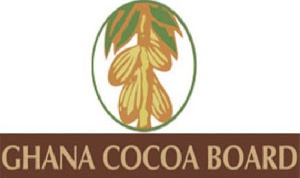Ghana Cocoa Board (COCOBOD) is hopeful of increasing the country's cocoa bean production to about 1.5million tonnes over the next four years, its Board Chairman, Hackman Owusu-Agyemang, has said.
"It is our objective to achieve a targeted 1.5 million tonnes of cocoa bean in the next couple of years. This is doable, we can achieve this within the next three to four year. A study conducted by the scientists at the Cocoa Research Institute has shown," he said.
Speaking at a three-day West Africa Fertilizer Agribusiness Conference 2017 in Accra, Mr. Owusu-Agyemang explained that achieving the projected figures is dependent on a number of factors including: soil fertility management, pest and disease control, artificial pollination of farms, and payment of remunerative producer price.
It also entails ensuring the quality of planting materials, the adoption of irrigation on farms and the replanting of over aged cocoa farms.
The country is hopeful of exceeding its revised 800,000 tonne target for cocoa production this season due to good rains.
Cocoa purchases in the country, the world's second-largest cocoa grower, totaled 691,149 tonnes as of March 23, from the start of the 2016/17 season on Oct. 1, a four percent rise on last season, Cocobod dat shows.
The Cocobod, Mr. Owusu-Agyemang said, is revamping its high tech programme by subsidizing fertilizers, both liquid and granular, for farmers to address the soil fertility problems.
"We are mindful of the fact that fertilizers supplied to farmers in the past have followed a blanket formula with rate of application of 150kg/acre, regardless of soil type and agro-ecological conditions.
Although the blanket fertilizer formulas lead to significant yield increase, especially in the second and third years of application, they are not supportive of sustainable cocoa production because they fail to account for the inherent characteristics of the various soil groups and agribusiness of the cocoa landscapes," he said.
To protect the environment and to optimise returns from fertilizer application, Mr. Owusu-Agyemang indicated that Cocobod is taking steps to ensure that fertilizer formulation for cocoa in the country is made site-specific, and to build up capacity of farmers in integrated soil fertility management for sustainable cocoa production.
"Our position is premises on the fact that many cocoa farmers in the country are characteristically smallholders and barely subsist with the addicted production outputs from the smaller farm units they cultivate.
Judicious use of farm input resources, including fertilizers, to optimize higher yields in these smallholders' farmlands is considered one key strategy to improve productivity in our soil," he said.
Mr. Owusu-Agyemang explained that the cocoa industry has been the backbone of the Ghanaian economy since the early 1900s. This pivotal role is still relevant even now that Ghana produces oil in commercial quantities.
"Today, the footprint of cocoa is seen as every facet of our life as a country. Government and managers of the cocoa industry are harnessing all resources, human, financial and material towards its revitalization," he said, addeding that the essence of these efforts towards the cocoa industry is premised on the fact that sub sector provides on the average, 20-25 percent of the total merchandise export earnings for the country, contributing 4-5 percent of GDP, with an employment to over 800,000 farm families.
To mordinise agriculture, he noted that technology adoption is not in the future, but “has to be now, "adding that COCOBOD is committed to working with stakeholders to ensure that knowledge and best practices emanating from science and research are adopted for the rapid modernization of the sector."
Deputy Minister for Food and Agriculture, Mr. William Agyapong Quaittoo, officially opening the West Africa Fertilizer Agribusiness conference which brought together fertilizer dealers in the value chain from West Africa, called for deeper private sector involvement in the agribusiness sector and its associated value chain to help encourage rural farmers create wealth and improve their standard of living.
He indicated that bankers in the country's financial sector have been encouraged to invest in the agriculture value chain with accessible lending strategies to help create value within the agribusiness value chain.
Mr. Quaittoo hinted that government is considering the adoption of solar irrigation to help boost cocoa, rice and other crop yield. "This is what government has thought about already and we are starting it now with the pilot projects," he said.
He indicated that the broader strategy in the country's agriculture transformation agenda is to attract the youth into the agriculture value chain.
"Gradually we will get the youth to get attracted into the cocoa value chain. This government is very much determined to move the Agriculture sector forward," Mr. Quaittoo remarked.
Business News of Thursday, 13 July 2017
Source: thebftonline.com













